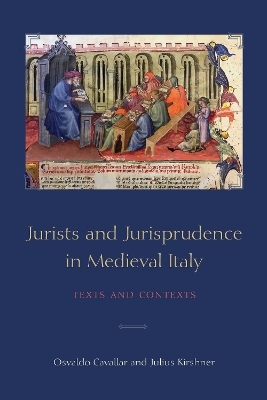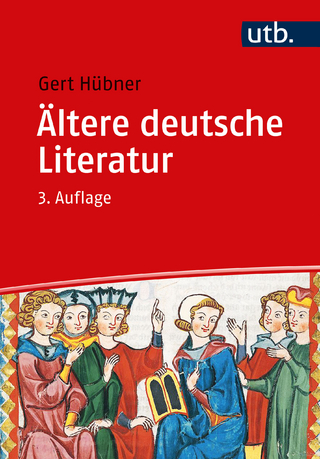
Jurists and Jurisprudence in Medieval Italy
University of Toronto Press (Verlag)
978-1-4875-0748-0 (ISBN)
Jurists and Jurisprudence in Medieval Italy is an original collection of texts exemplifying medieval Italian jurisprudence, known as the ius commune. Translated for the first time into English, many of the texts exist only in early printed editions and manuscripts. Featuring commentaries by leading medieval civil law jurists, notably Azo Portius, Accursius, Albertus Gandinus, Bartolus of Sassoferrato, and Baldus de Ubaldis, this book covers a wide range of topics, including how to teach and study law, the production of legal texts, the ethical norms guiding practitioners, civil and criminal procedures, and family matters.
The translations, together with context-setting introductions, highlight fundamental legal concepts and practices and the milieu in which jurists operated. They offer entry points for exploring perennial subjects such as the professionalization of lawyers, the tangled relationship between law and morality, the role of gender in the socio-legal order, and the extent to which the ius commune can be considered an autonomous system of law.
Osvaldo Cavallar is a professor of Christian Studies at Nanzan University. Julius Kirshner is an emeritus professor of Medieval and Renaissance History at the University of Chicago.
Preface by Lawrin Armstrong
Acknowledgments
Abbreviations
Short Titles
Introduction
1. Professors and Students
1. Foundations
1.1. The Constitution Habita of Emperor Frederick I Barbarossa (1155/58)
1.2. Accursius’s Glosses to the Constitution Habita
1.3. Students as Citizens in the Statutes of Modena (1327)
2. "We Give You the Licence to Teach Here and Everywhere"
2.1. Baldus de Ubaldis, Consilium on the Studium Generale of Milan (ca. 1393- 1396)
3. Privileges of Doctors and Students
3.1. Simon of Borsano, Privileges of Doctors and Students (1361- 1370)
4. How to Teach and Study Canon and Civil Law
4.1. Franciscus de Zabarellis, How to Teach and Study Canon and Civil Law (ca. 1410)
5. The Many Dwelling Places of Civil Wisdozm
5.1. Bartolus of Sassoferrato, Oration on Conferring the Doctorate of Law
6. Death Benefits
6.1. Consilium of Jacobus Niccoli (1400)
7. Hired Hands
7.1. Azo, Hiring (1208- 1210)
7.2. Rainerius of Perugia, Leasing out a Work to be Copied (1242)
7.3. Salatiele, Copyists and Other Persons Obligating Themselves to Perform Services [Contract and Glosses] (1248- 1254)
7.4. Rolandinus de Passegeriis, Hiring Another Person’s Services to Copy a Work (1273)
8. Law Students’ Books
8.1. Baldus de Ubaldis, Consilium [I] (ca. 1393–1396)
8.2. Baldus de Ubaldis, Consilium [II] (ca. 1393–1396)
9. "Many Books"
9.1. Oldradus de Ponte, Whether It Is Advantageous to Have Many Books (ca. 1320s)
10. Nobility, Usefulness, and Origin of Law
10.1. Doctoral Oration (ca. 1450)
2. Legal Profession
11. Advocates
11.1. Guilelmus Durantis, Mirror of Law (ca. 1284- 1289)
12. Fees
12.1. Azo, Quaestio disputata
13. Proof of a Doctoral Degree
13.1. Certifying a Judge’s Doctoral Degree in Florence (1374)
14. Bella Figura: Florentine Jurists and Their Wives
14.1. Deliberation of the Guild of Judges and Notaries of Florence (9 Sept. 1366)
14.2. Provisions of Florence’s Sumptuary Laws, 1377 and 1388
14.3. Stephanus de Bonacursis and Others, Consilium on the Exemption of Jurists and Their Wives from Florence’s Sumptuary Laws (1390)
15. A Waste of Time
15.1. Franco Sacchetti, Novella XL (ca. 1392- 1393)
16. "From the Mouth of God"
16.1. Eulogy of Marianus Socinus the Elder of Siena (1467)
3. Civil and Criminal Procedure
17. Civil Procedure
17.1. Civil Procedure in the Statutes of Florence (1415)
18. Consilium Sapientis
18.1. Requesting a consilium sapientis, Statutes of Florence (1415)
19. Witnesses
19.1. Treatise on Witnesses (Scientiam) (ca. 1230s)
20. False Testimony
20.1. Franciscus de Guicciardinis, Consilium (ca. 1505- 1516)
21. Criminal Procedure
21.1. Albertus Gandinus, Tract on Crimes (1300)
21.2. Judicial Inquiry of Albertus Gandinus against Cambinus Belli of Florence (1289)
21.3. Expenses Incurred during a Trial (1298)
4. Crime
22. Wounds from Assault
22.1. Tract on Wounds
23. Self-defence
23.1. Baldus de Ubaldis, Consilium (ca. 1384)
24. Vendetta
24.1. Baldus de Ubaldis, Consilium (ca. 1391–1393)
25. Adultery
25.1. Ivus de Coppolis, Consilium (ca. 1420–1441)
26. Abortion
26.1. Digest, Glossa, and Bartolus of Sassoferrato
26.2. Statutes of Biella (1245)
26.3. Statutes of Siena (1309)
26.4. Statutes of Castiglion Aretino (1384)
26.5. Albericus of Rosciate, Questions Concerning Statutes (1358)
5. Personal and Civic Status
27. Serfdom
27.1. Martinus of Fano, Serfs (ca. 1256- 1259)
27.2. Martinus of Fano, Notarial Forms for Drafting Contracts and Written Complaints (ca. 1232)
28. Citizenship
28.1. Statutes of Arezzo (1327): "Rubrics on Making New Citizens"
29. Citizen Bartolus
29.1. Petition to Grant Bartolus of Sassoferrato and His Brother Bonacursius Perugian Citizenship (1348)
30. Making New Citizens
30.1. Bartolus of Sassoferrato, Consilium
31. Dual Citizenship
31.1. An Anonymous Opinion and Baldus de Ubaldis, Consilium (ca. 1376- 1379)
32. Loss and Reacquisition of Citizenship
32.1. Angelus de Ubaldis, Consilium
33. Married Women’s Citizenship (1)
33.1. Digest, Code, Glossa, and Bartolus of Sassoferrato
34. Married Women’s Citizenship (2)
34.1. Jacobus de Fermo, Consilium (ca. 1400)
34.2. Dionisius de Barigianis, Consilium (ca. post 1411)
35. Jews as Citizens
35.1. Ordinance on the Privileges and Obligations of Jewish Residents of Perugia (1381)
6. Family Matters
36. Paternal Power (Patria Potestas)
36.1. Institutes (1.9): "Paternal Power"
36.2. Glosses to Institutes (1.9): "Paternal Power"
36.3. Angelus de Gambilionibus, Commentary to § Ius autem (Inst. 1.9.2) (ca. 1441- 1449)
36.4. Statutes of Perugia (1342): "Damnable Children Harming Their Own Parents"
36.5. Statutes of Chianciano (1287): "Contract Made by a Son-in-Power"
36.6. Albericus of Rosciate, Questions Concerning Statutes (1358)
36.7. Franciscus de Guicciardinis, Consilium (ca. 1505–1516)
37. Children Born Illegitimately
37.1. Benedictus de Barzis, Children Born Illegitimately (1456)
38. Contracting Marriage in Late Medieval Florence
38.1. Betrothal Contract (Sponsalitium) (1391)
38.2. Contracting Marriage (Anulum) (1391)
39. Dowries
39.1. Martinus Gosia, The Law of Dowries (ca. 1140)
40. Vested Interests
40.1. Bartolus of Sassoferrato, Commentary to Dig. 24. 3. 66. 1, In his rebus quas, § Servis uxoris
40.2. Angelus de Ubaldis, Consilium
40.3. Petrus de Albisis, Consilium
41. Prohibition of Gifts between Husband and Wife
41.1. Dig. 24. 1. 1, Moribus
41.2. Dig. 24. 1. 2, Non cessat
41.3. Baldus de Ubaldis, [First] Commentary to Dig. 24. 1. 1, Moribus
41.4. Baldus de Ubaldis, [Second] Commentary to Dig. 24. 1. 1, Moribus
41.5. Baldus de Ubaldis, Consilium (ca. 1396- 1400)
42. Remarriage of Widows and Conflicting Claims to the Dowry
42.1. Franciscus de Albergottis, Consilium (ca. 1362- 1364)
42.2. Baldus de Ubaldis, Consilium (ca. 1362- 1364)
43. Testamentary and Intestate Succession
43.1. Bartolus of Sassoferrato, Last Will (1356)
43.2. Bartolus of Sassoferrato, Consilium on Succession in stirpes or in capita
43.3. Bartolus of Sassoferrato, Consilium on Succession by Line of Descent
43.4. Angelus de Ubaldis, Consilium
44. Fraternal Households
44.1. Jacobus de Balduinis, Brothers Living Together (ca. post 1213)
45. Support
45.1. Martinus de Fano, Support (ca. 1265- 1272)
Glossary
Appendix 1. The Medieval System of Legal Citations
Appendix 2. Selected Jurists
Index
| Erscheinungsdatum | 27.05.2021 |
|---|---|
| Reihe/Serie | Toronto Studies in Medieval Law |
| Verlagsort | Toronto |
| Sprache | englisch |
| Maße | 160 x 234 mm |
| Gewicht | 1280 g |
| Themenwelt | Geschichte ► Allgemeine Geschichte ► Mittelalter |
| Geisteswissenschaften ► Geschichte ► Regional- / Ländergeschichte | |
| Geschichte ► Teilgebiete der Geschichte ► Militärgeschichte | |
| Recht / Steuern ► Allgemeines / Lexika | |
| Recht / Steuern ► Rechtsgeschichte | |
| ISBN-10 | 1-4875-0748-8 / 1487507488 |
| ISBN-13 | 978-1-4875-0748-0 / 9781487507480 |
| Zustand | Neuware |
| Haben Sie eine Frage zum Produkt? |
aus dem Bereich


